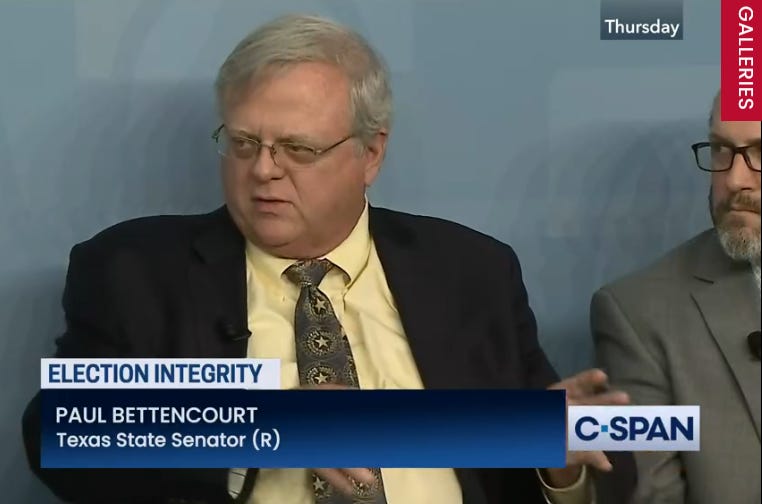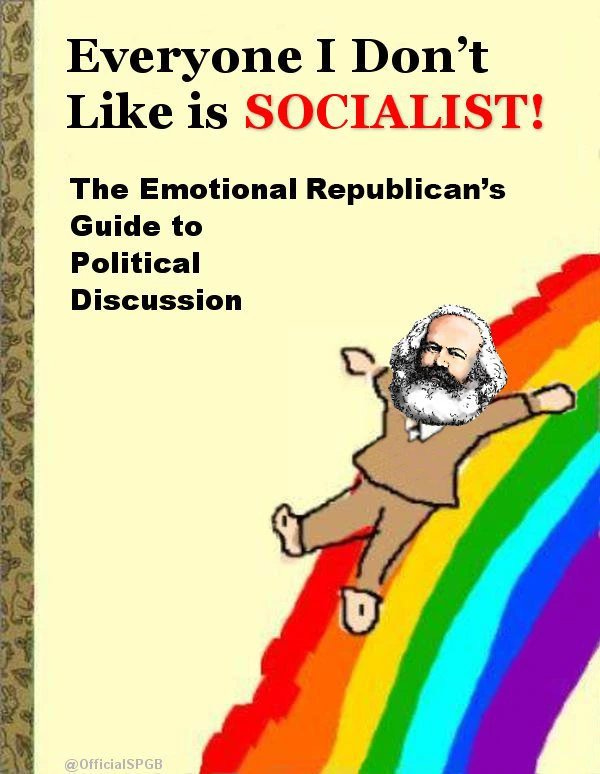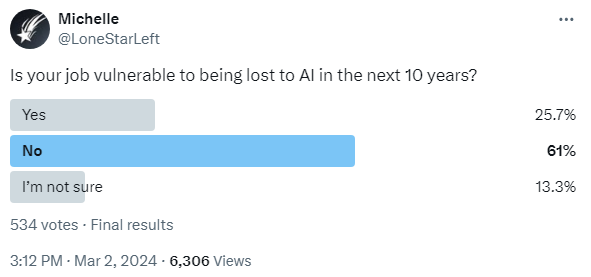The GOP’s War On UBI: How Bettencourt Is Pushing Texas To A Dystopian Future
Fighting poverty or preserving inequality? The stakes of Bettencourt’s UBI war.
After Ken Paxton sued Harris County earlier this year for their Uplift Harris Program, a guaranteed income pilot, the Republican-led Texas Supreme Court brought it to a screeching halt. Harris County Judge Lina Hidalgo and Harris County Commissioners voted on Uplift Harris 2.0 three weeks ago, passing this newly revised guaranteed income program. This led to a whole new freakout from Republicans, particularly Senator Paul Bettencourt.
Yesterday, the Texas Senate Committee on Local Government, chaired by Senator Bettencourt, met to discuss UBI (Universal Basic Income) programs—and not in a good way.
This is significant because this was the first hearing in the Texas Legislature ever held regarding UBI. Even though previous bills have been filed to ban any form of UBI, they have never been considered.
However, because of this grudge between Senator Bettencourt and Judge Hidalgo, he seems bent on picking up the torch. He plans to push legislation banning UBI programs in Texas in the 89th Legislature (which starts in January).
While UBI has many economic benefits as an anti-poverty program (we’ll get into that), programs like these will become increasingly prevalent and needed in the coming decade. Banning UBI programs statewide would lead to severe repercussions if there were sudden and mass employment losses, especially considering that the State Legislature only meets once every two years.
These programs provide essential support, allowing people to meet basic needs like groceries, housing, and healthcare.
Listen to what Sammy, a data and policy analyst from Every Texan, had to say in Bettencourt’s meeting yesterday:
If you’re new here, hyperlinks lead to sources.
UBI programs have shown positive health, employment, and poverty reduction results. According to the Stanford Basic Income Lab, at least 160 UBI tests have been conducted globally. About two-thirds of those tests have occurred in the US, but the largest and longest test is underway in Kenya.
Since 1982, the Alaskan government has given each citizen an annual check based on the state’s oil production. The payout typically ranges from $1,000 to $2,000, but it reached a high of $3,284 in 2022.
Further reading:
Washington Post: Universal Basic Income Has Been Tested Repeatedly. It Works. Will America Ever Embrace It?
Black Enterprise: Experts Say Universal Basic Incom Programs Work, But Republicans Keep Fighting Them
Business Insider: Universal basic income is working — even in red states
LoneStarLeft is a 100% reader-supported daily(ish) look at Texas Politics from the left.
If you enjoy this publication, please consider becoming a paid subscriber.
Why are UBI programs important for Texas right now?
The consequences of poverty in America are substandard housing, homelessness, inadequate nutrition, food insecurity, inadequate child care, lack of access to health care, unsafe neighborhoods, and under-resourced schools.
In Texas, the poverty rate is over 14%—the 10th highest poverty in America.
Poorer children and teens are also at greater risk for adverse outcomes, such as poor academic achievement, school dropout, abuse and neglect, behavioral and socioemotional problems, physical health problems, and developmental delays.
Economists estimate that child poverty costs the US economy an estimated $500 billion a year, reduces productivity and economic output by 1.3 percent of GDP, raises crime, and increases health expenditure.
These programs recognize the urgent need to address the consequences of poverty in America. By implementing UBI programs, we can alleviate the financial strain on struggling households, provide a safety net, and invest in the well-being and potential of the future. These initiatives are essential for creating a more equitable society and mitigating the negative impacts of poverty in America.
So, why is Senator Bettencourt against UBI? Well, he calls this program “Lottery Socialism.”
Universal Basic Income and Guaranteed Income Programs are NOT Socialism.
Socialism is an economic and political system where the means of production—such as factories, land, and resources—are owned or controlled by the community or the state.
Programs like Harris County’s Uplift Harris 2.0 are not socialism because they do not involve government ownership of the means of production.
Instead, UBI is a form of economic policy where citizens receive regular payments to ensure a minimum standard of living. While it provides financial support, UBI operates within capitalist frameworks, allowing individuals to use the money as they see fit in a market economy. It doesn’t aim to eliminate private property or market dynamics, which are key aspects of socialism.
We’re living through the Red Scare 3.0, where Conservatives call everything in the world “socialism” or “communism.”
But I want to point something out to you: a member of the Heritage Foundation testified at yesterday’s hearing. Yes, the same Heritage Foundation that wrote Project 2025. You can hear the other side’s argument, but at the beginning of this video, Bettencourt tells the Heritage Foundation guy, “Tell your president, Kevin, hi.”
Kevin Roberts is the architect of Project 2025 and the same guy who said we’re in a Civil War, “which will remain bloodless if the left allows it.”
Here is what you need to know about Senator Paul Bettencourt. Here he is on C-Span in 2021 with Project 2025 architect Kevin Roberts:

Bettencourt (sometimes referred to as Texas’ voter suppression Czar) has had long ties with the Heritage Foundation and ALEC, and that’s why he knows Kevin Robers by first name. He made appearances with Roberts years ago.
Furthermore, many of the policy ideas in Project 2025 have already been tried or implemented in Texas; Bettencourt wrote and filed many of those policies.
Bettencourt is a Project 2025 guy whose policy agenda aligns with Project 2025. Full stop. Suppose you believe that Project 2025 is a fascist agenda. In that case, you have to know that Bettencourt is one of the fascists getting the agenda implemented on the state level, and he’s against anti-poverty UBI programs.
While Bettencourt and his allies may claim to defend capitalism by opposing UBI programs, their stance aligns more with fascist ideals than free-market capitalism.
Capitalism promotes individual freedom and economic mobility through market mechanisms. It acknowledges that poverty limits individuals’ ability to participate fully in the economy, which is why we have anti-poverty programs like SNAP or the reduced income tax credit.
Fascism emphasizes state control, using policy to maintain rigid social hierarchies and suppress challenges to the established order, for example, banning local governments from participating in anti-poverty programs.
By opposing this anti-poverty program, Bettencourt is seeking to preserve economic inequality and reinforce authoritarian control, ensuring that the underprivileged remain dependent and powerless.
Fascism uses social policies selectively to consolidate power, offering minimal support not to empower people experiencing poverty but to maintain social control. Unlike capitalism, which focuses on growth and innovation through market participation, fascism resists structural changes that uplift marginalized communities.
Rejecting UBI programs under the guise of “protecting capitalism” is a fascist value of maintaining inequality and upholding centralized, authoritarian power over economic justice.
It should also be noted that several “Conservative Think Tanks,” which are all billionaire-funded, testified at this hearing yesterday against UBI. That includes:
Why will programs like Uplift Harris 2.0 become increasingly necessary over the next few years?
Earlier this year, I asked Twitter (a very scientific polling method) if they thought their jobs would be vulnerable to being lost to AI in the next ten years. The majority answered “no,” but the experts say otherwise.
In a 2023 study, Goldman Sachs predicted that 300 million jobs would be lost or degraded by artificial intelligence by 2030. Thanks to AI, companies would benefit from cost savings. They can deploy their resources toward building and growing businesses, ultimately increasing annual global GDP by 7%.
According to this McKinsey study, an expected 400 to 800 million people will lose their jobs due to Artificial Intelligence by 2030.
While many people right now may think their jobs are safe, we will see an explosion in automation technology that will change our lives and society.
Low-skill jobs like warehouse workers, janitors, clerks, and cashiers will likely go first.
Amazon would be the perfect case study. Amazon is leading a robotics race. Today, over 200,000 mobile robots and hundreds of thousands of human workers work inside its warehouse network. Their goal is eventually to replace human workers. These robots will ultimately operate for $3 per hour, saving Amazon billions annually in salary pay.
And check out this bathroom cleaning robot:
Other jobs that robots and automation will eventually take:
Healthcare roles, such as in nursing homes for medication delivery and companionship.
Domestic jobs, like cleaning or assistance.
Commercial use, such as in fast-food, the service industry, offices, and hospitals.
Industrial work, like in construction or equipment handling.
Did you see the announcement last week from the company 1X, which introduced NEO Beta, a humanoid robot for the home?
The merging of AI and robotics is a budding field in which we’re still in the beginning stages. When this video hit the internet last week, many people accused the robot of being a man in a suit. They were wrong, though.
Automation is happening in our society, and if you haven’t seen it around you yet, wait because it’s coming. That’s why banning anti-poverty programs, like UBI programs, when we are likely on the precipice of rapid and significant societal changes is reckless and short-sighted.
As jobs become increasingly automated, entire industries may be displaced, and without safety nets like UBI or other guaranteed income programs, millions of people could face economic hardship. Preparing for this shift is crucial to ensuring society adapts and thrives.
If we don’t vote against these fascist-aligned Republicans, we risk a future where inequality reigns supreme and human dignity is sacrificed for the whims of the elite.
Republicans like Senator Bettencourt, aligned with the fascist agenda of Project 2025, are dead set on dismantling anti-poverty programs, pushing us toward a dystopian Ayn Rand hellscape. In their vision, millions will be left unemployed, houseless, and starving while the wealthy consolidate power.
More conversations about taxing automation and lowering human rights costs like healthcare and housing must be held. Meanwhile, pilot programs like Uplift Harris 2.0 serve a valuable role in fighting poverty now and testing programs that will become necessary in the future.
Voting is the most important thing you can do to help Texas move forward with the type of world we want to live in.
Vote early, vote often, just vote.
October 7: Last day to register to vote.
October 21: First day to early vote.
October 25: Last day to apply for a mail-in ballot.
November 1: Last day to early vote.
November 5: Election day!
LoneStarLeft’s Newsletter is a reader-supported publication. To receive new posts and support my work, consider becoming a free or paid subscriber.
Follow me on Facebook, Twitter, TikTok, Threads, YouTube, and Instagram.







ever wonder why MAGA has taken to Putin and Orban and Nazism and meanness and hate....
It has deep roots in ,,,wait for it....dark , depressing German political philosophers. A fun bunch fer sure
https://www.salon.com/2024/09/07/the-far-right-actually-hates-america-its-dark-ideology-has-foreign-roots/